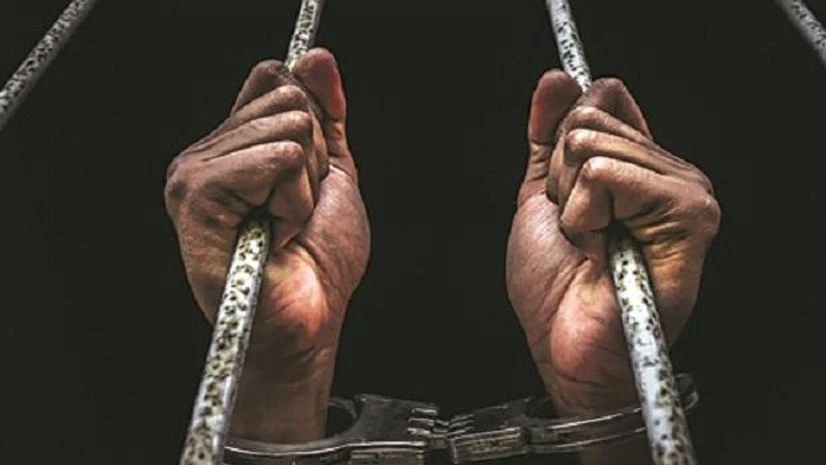A total of 561 prisoners are on death row in the country, the highest at the end of a calendar year in two decades -- a rise of 45.71 per cent in such inmates since 2015, a report revealed.
The eighth edition of the 'Death Penalty in India: Annual Statistics Report' published by Project 39A at National Law University, Delhi said the trial courts imposed 120 death sentences in 2023 but the year witnessed lowest rate of death sentence confirmations by the appellate courts since 2000, with the Supreme Court not confirming any death sentence for a second calendar year after 2021.
"The Supreme Court did not confirm any death sentence in 2023. In the High Courts, only one death sentence was confirmed by the Karnataka High Court in a murder simpliciter case. In doing so, 2023 marks the lowest rate of death sentence confirmations by the appellate courts since 2000," said the report.
The report said the President of India rejected one mercy petition in March 2023 in a case of kidnapping, rape and murder of a minor in 2008. There are a total of 488 death row prisoners awaiting judgment from the high courts, it said.
It said that the top court acquitted four prisoners in three death penalty appeals, remanded two death penalty cases to the trial court and the high court, and commuted the death sentences of three death row prisoners in criminal appeals.
Two prisoners in two death penalty cases wee released upon finding that they were children in conflict with the law at the time of the offences.
More From This Section
"At the end of 2023, 120 death sentences were imposed by trial courts and 561 prisoners were living under a sentence of death in India.
"This makes 2023 the year with the highest number of prisoners on death row in nearly two decades, and the second highest since the turn of this century according to the National Crime Record Bureau's Prison Statistics Reports. The year 2023 also witnesses a 45.71% increase in the death row population since 2015," the report stated.
"These figures denote a widening gulf between the efforts from appellate courts to improve the institutional capacity of administering the death penalty, and the persisting capital sentencing crisis at trial courts," it added.
According to data, there were 541 and 490 inmates on death row at the end of 2022 and 2021, respectively, and 167 and 146 death sentences were awarded in 2022 and 2021.
The report said the death row population has increased over the years and in 2023, the most death penalties were awarded in crimes involving sexual offences.
"Nearly 53.30% of the 120 death sentences imposed by trial courts in 2023 were for homicidal rape cases. Trial courts imposed death sentences in 86.96% of its cases in the absence of any information relating to the accused.
"Despite the Supreme Court's mandate in Manoj v. State of Madhya Pradesh, trial courts did not call for the probation officers' report, the report on psychiatric evaluation of the accused or their jail conduct," it said.
As per the report, most death sentences, i.e. 33, were awarded by trial courts in Uttar Pradesh last year, followed by 12 in Jharkhand and 11 each in Gujarat, Haryana and Madhya Pradesh and 10 in West Bengal.
There were no such instances from Manipur, Tamil Nadu, Himachal Pradesh and Uttarakhand.
"Death sentences were imposed on the same day, or within one day of conviction, in at least 37.14% of death penalty cases at the trial courts in 2023. 45.71% of death sentence orders were passed within two to seven days from conviction. Trial courts imposed death sentences after one week from conviction in only 17.14% of all death penalty cases," the report said.
The report further said the acquittals and remands by the Supreme Court and the high courts in death penalty cases indicated "significant concerns with the quality of police investigations and appreciation of evidence by lower courts in death penalty cases."
High courts acquitted 36 prisoners of all charges and remanded three cases, involving five prisoners, to the trial court for significant lapses in the cross-examination of forensic evidence and for the perfunctory nature of the sentencing exercise.
It also said the Bharatiya Nyaya Sanhita Bill, which will replace the existing Indian Penal Code, has increased the number of offences punishable with the death penalty, from twelve to eighteen offences.
Additionally, the new law codifies procedures on the filing of mercy petitions by death row prisoners, and restricts the scope of sentences that can be imposed upon commuting a death sentence to life imprisonment.
(Only the headline and picture of this report may have been reworked by the Business Standard staff; the rest of the content is auto-generated from a syndicated feed.)

)
